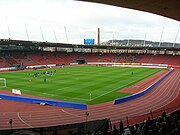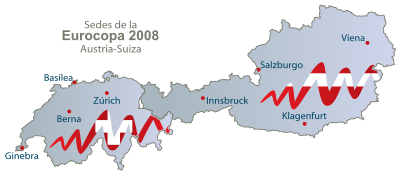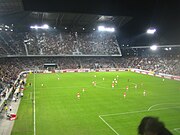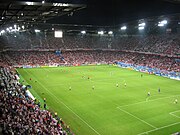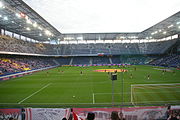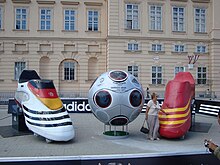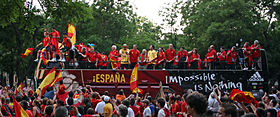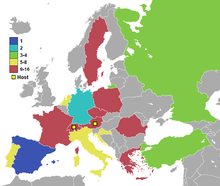Euro 2008
The UEFA EURO 2008 (officially the UEFA European Football Championship or UEFA EURO 2008™) was the 13th edition of the UEFA Euro, the main tournament between European soccer teams organized by UEFA. This version of the tournament was held in Austria and Switzerland, between June 7 and June 29, 2008, being the second time that the tournament was organized by two countries (after Euro 2000 held in Belgium and the Netherlands). and the first that was hosted by each of these nations.
The candidature of Austria and Switzerland was proclaimed by the General Committee of UEFA, on December 12, 2002, surpassing a total of six candidatures. 16 teams participated in the event, 14 of which won their participation in this tournament after passing a qualifying process played between 2006 and 2007 by 52 teams, to which were added the teams of Austria and Switzerland, automatically classified as hostesses. The participating teams were divided into four groups of four teams each; after playing a league format in each group, the best two of each qualified for the next round. The eight qualifiers later faced each other in a direct elimination system until the champion was determined. The final was played at the Ernst Happel Stadium in Vienna. In that match, Spain won its second continental title by defeating Germany 1:0.
It is estimated that 1,050,000 people attended the 31 matches played during the final phase of the tournament and that the cumulative audience of the event on television reached 8,000 million viewers worldwide, making it one of the most important sporting events. seen from 2008, along with the 2008 Beijing Olympics.
Organization
Choice
The candidacy of Austria and Switzerland to organize Euro 2008 was selected by the UEFA Congress, on December 12, 2002, in an election to which a total of seven candidacies were originally presented.
The proposal arose after the defeat of the binational candidacy led by Austria together with Hungary for Euro 2004, which was finally played in Portugal; after that, the Austrian Football Federation (ÖFB) and the Swiss Football Association (ASF) began preparations for a joint bid. With the theme Close to you ('Close to you' in English), the transalpine bid presented a compact plan focused on high-quality accommodation, excellent telecommunications and transport services (especially rail) and with facilities for the deployment of security.
The Austro-Swiss candidacy was considered from the outset as the main favorite over the other seven candidacies. Hungary presented itself in a lonely way, as did Russia. However, most of the bids were multinational: a joint Celtic bid from Scotland and Ireland, one from Greece and Turkey, one from Croatia and Bosnia and Herzegovina and finally a Scandinavian bid from four countries (Denmark, Finland, Norway and Sweden).
The Celtic bid was considered the closest rival to the Austro-Swiss project, especially due to its better stadium condition. On the part of Austria and Switzerland, the only stadiums that met UEFA's requirements up to that time were the Ernst Happel Stadium and St. Jakob Park; Of these, only the first had a capacity of more than 40,000 spectators. Scotland and Ireland, for their part, had five out of 50,000 spectators. In the case of the Scandinavian candidacy, although it had the advantage of having experience in hosting major sporting events (such as Euro 1992 in Sweden), the big The distances between their venues and the lack of large stadiums affected their chances of being elected, as did the fact that it was the first time that a sports candidacy was carried out by four host countries, considering that only in 2000 was an event carried out for the first time by two host countries. countries (Euro 2000) and the 2002 World Cup had presented various logistical problems between Japan and South Korea.
During the election, the Russian and Bosnian-Croat candidacies were initially ruled out. The remaining bids were put to a vote, although the UEFA committee officially recommended the bids from Austria-Switzerland, Greece-Turkey, Scandinavia and Hungary. The Celtic candidacy, despite its certain favoritism, was not considered within the recommendations and finished fourth in the vote. On the other hand, the Hungarian candidacy caused surprise by being second in the vote, although it failed to overcome the wide victory of the candidacy of Austria and Switzerland that would ensure the realization of Euro 2008 in those countries.
Locations
For this edition of the tournament, eight venues were arranged, four of which are located in each of the host countries. In each one, three matches of the first phase were played, in such a way that all the matches played by the Swiss team (including the opening match), were played at St. Jakob Park in Basel, while those of the Swiss team Austria were held at the Ernst Happel Stadium in the capital Vienna. These two stadiums were the only venues for the second phase matches, with two quarterfinal matches and one semifinal being played in each, while the final was held at the Viennese venue.
Most of the stadiums underwent renovations in preparation for the tournament, expanding their capacity at least temporarily. Three stadiums were completely rebuilt on the site of its predecessor: the Wörtherseestadion in Klagenfurt, the Stade de Suisse in Bern and the Letzigrund Stadion in Zurich. The latter was built after the rejection of the remodeling originally proposed for the Hardturm-Stadion in 2004 and which even jeopardized the realization of the championship; UEFA accepted the change in plans at the beginning of 2005 and the Bernese population approved in a referendum a loan of 69 million euros for the construction of the enclosure. The other two Swiss venues, St. Jakob Park and Stade de Genève, were built just a few years before the event, requiring little modification.
Referees
UEFA summoned twelve referees from UEFA member countries to perform during Euro 2008. UEFA appointed two assistants of the same nationality to each to ensure that the trio of referees are knowledgeable and experienced among them. Most of the judges have had experience in tournaments such as the UEFA Champions League and some even participated in the 2006 Soccer World Cup. Additionally, eight officials were summoned to perform the roles of fourth and fifth referee, used in case of injury to one of the officials during the development of a match.
Tournament Ball
The ball used during Euro 2008 was the adidas Europass, made by the German company Adidas. This ball corresponds to an evolution with respect to the adidas Teamgeist, used during the 2006 Soccer World Cup played two years earlier in Germany. This ball had a white exterior design with twelve dark circles or polka dots and certain red motifs, representing the flags of the two host countries.
For the final match of the tournament, a special edition of the Europass was designed, called the adidas Europass Gloria. On the ball, which unlike the traditional one was silver in color, the date and place of the match and the teams that played for the trophy, Germany and Spain, were printed in English.
Participating teams
To qualify for Euro 2008, a previous tournament was held between September 2006 and November 2007. For this, a draw was held in Montreux, Switzerland, on January 27, 2006, in which seven qualifying groups were formed, where the first two of each will qualify for the final round. Austria and Switzerland qualified automatically exercising their right as organizers, while the big surprise for the latter was the absence and elimination of England in the qualifying round, finishing third in their group behind Croatia and Russia, without a chance. to be able to play said tournament.
The draw for the final phase of the competition was made on December 3, 2007. The 16 qualified teams were arranged in four pots based on their UEFA coefficient. In the first drum were placed Austria and Switzerland, hosts of this edition, Greece, current champion, and the Netherlands, the team with the highest UEFA coefficient. Croatia, Italy, the Czech Republic and Sweden were in the second pot, while the third was made up of Germany, Spain, Portugal and Romania. Finally, the fourth bass drum was made up of France, Poland, Russia and Turkey.
In italics, rookie teams in the Eurocup:
| Participating teams | |||
|---|---|---|---|
| GER | FRA | BY | RUS |
| AUT | GRE | POL | SWE |
| CRO | ITA | CZE | SUI |
| ESP | NED | ROU | TUR |
Gold Player
To mark UEFA's 50th anniversary, each member association was asked to vote for their best player of the past 50 years.
Development
During the first phase, the teams of Croatia, Spain, the Netherlands and Portugal reached the final phase of the tournament after winning their respective groups, being accompanied by the teams of Germany, Italy, Russia and Turkey. The offensive football proposed by many of the named teams was considered vital for their classification and good performance, to the detriment of more conservative teams, such as France and Greece, who were relegated to the last places in the tournament.
In Group A, and led by Cristiano Ronaldo —considered prior to the tournament as one of the best players of the moment—, the Portuguese team qualified without major obstacles to the next phase, defeating Turkey and the Czech Republic. Switzerland failed to take advantage of their home status and were eliminated in the second game, salvaging a victory in the final game against the already qualified Portuguese. The victories of the Turks and the Czechs against the Swiss left the definition of the second classified in Group A for the dramatic game that faced both teams in Geneva. The Czechs dominated much of the match and were 2:0 up on the scoreboard but Turkey tried to reverse the score. A goal from Arda Turan at 75'; revived the hopes of the Turkish team that would materialize after a serious mistake by goalkeeper Petr Čech that would culminate in Nihat Kahveci's goal at 85'. Less than three minutes from the end, and when everything seemed that the definition by penalties would deliver the result, Nihat scored again and left Turkey in the second phase.
Germany were one of the favorites to win Group B, but failed to show it on the pitch. A faltering win against Poland was followed by a resounding loss to Croatia. The Germans made it through to the next round, eliminating co-hosts Austria 1:0 thanks to a goal from their captain Michael Ballack, although without improving their level of play. The Croatian team won all three of their games and became one of the most effective teams in the first round.
The so-called group of death pitted the finalists of the 2006 Soccer World Cup against Italy and France. Despite the titles of both teams, both were vastly outclassed by the Netherlands. The Dutch won 3:0 against the Italians and 4:1 against the French. Romania managed to get two draws against Italy and France, but were knocked out after a 2:0 defeat by the Dutch. In the final match, Italy defeated France and qualified for the next round with group leaders, the Netherlands.
In Group D, Spain managed to remain undefeated after a successive streak of victories: 4:1 against Russia, 2:1 against Sweden and the same score against Greece. The main figure was the attacker David Villa, who after a hat trick against the Russians and a goal against the Swedes, managed to become the top scorer in the championship. Russia, despite the win with which they started the championship, managed to overcome with the return of Andrei Arshavin and went to the next round, leaving Sweden and Greece on the way. The Hellenes finished in last place in the group, and at the end of the tournament, going from being the current champions of the previous edition to the last classified in this one, something unusual and singular in the history of world football.
In the quarterfinals, however, most of the favorites fell. Germany defeated Portugal 3:2 and Russia defeated the Netherlands 3:1 after extra time. Croatia and Turkey drew goalless during the regular period and in extra time, both scored a goal minutes before the end, so there was a penalty shootout in which the Turks won, thus eliminating the undefeated Croatians. Through this same method, Italy and Spain defined their result after drawing without goals during the 120 minutes of the match, passing Spain to the semifinals after winning on penalties 24 years after their last semifinal in an absolute international tournament, in Euro 1984..
Germany and Turkey faced each other in one of the semifinals playing drama again. Both teams were tied for almost the entire regulation time, until at 79', Miroslav Klose discounted for Germany. Following the tradition of the last games, Turkey scored minutes from the end, but Philipp Lahm would seal the 3:2 in the final score. The game was also marked by a strong storm in Vienna that cut off international television broadcasts for several minutes in an unprecedented way, preventing many from seeing the final goals. In the other semifinal, Spain qualified brilliantly for the final after defeating Russia again, this time 3:0 with goals from Xavi Hernández, Dani Güiza and David Silva.
In the final match, Spain and Germany met at the Ernst Happel Stadium in Vienna. Initially, Germany held the party's dominance, but slowly began to lose control of it. At 32', Fernando Torres disputed a ball after a through ball from Xavi Hernández with Philipp Lahm, whom he gained position in speed and, before goalkeeper Jens Lehmann came out, managed to dodge it and score a goal, chipping the ball. ball over it. With the score in their favor, Spain controlled the match and despite the German attempts to discount, the match would end 1:0. The undefeated Spanish team was thus crowned for the second time as Eurocup champion after Eurocopa 1964, breaking a 44-year drought.
Results
- The hours indicated in the matches correspond to the local time zones of Austria and Switzerland: Summer hours of Central Europe – CEST: (UTC+2).
Group stage
– Qualified for the quarterfinals final.
Group A
| Selection | Pts | PJ | PG | PE | P | GF | GC | Dif |
|---|---|---|---|---|---|---|---|---|
| BY | 6 | 3 | 2 | 0 | 1 | 5 | 3 | 2 |
| TUR | 6 | 3 | 2 | 0 | 1 | 5 | 5 | 0 |
| CZE | 3 | 3 | 1 | 0 | 2 | 4 | 6 | −2 |
| SUI | 3 | 3 | 1 | 0 | 2 | 3 | 3 | 0 |
| 7 June 2008, 18:00 | Switzerland | 0:1 (0:0) | St. Jakob Park, Basel | |||
| Report | Svěrkoš | Attendance: 39 730 spectators Arbitrator: | ||||
| 7 June 2008, 20:45 | Portugal | 2:0 (0:0) | Stade de Genève, Geneva | |||
| Pepe Meireles | Report | Assistance: 29 016 spectators Arbitrator: | ||||
| 11 June 2008, 18:00 | Czech Republic | 1:3 (1:1) | Stade de Genève, Geneva | |||
| Sionko | Report | Deco C. Ronaldo Quaresma | Assistance: 29 016 spectators Arbitrator: | |||
| 11 June 2008, 20:45 | Switzerland | 1:2 (1:0) | St. Jakob Park, Basel | |||
| H. Yakın | Report | Şentürk Turan | Attendance: 39 730 spectators Arbitrator: | |||
| 15 June 2008, 20:45 | Switzerland | 2:0 (0:0) | St. Jakob Park, Basel | |||
| H. Yakın | Report | Attendance: 39 730 spectators Arbitrator: | ||||
| 15 June 2008, 20:45 | Turkey | 3:2 (0:1) | Stade de Genève, Geneva | |||
| Turan Nihat | Report | Koller Plašil | Assistance: 29 016 spectators Arbitrator: | |||
Group B
| Selection | Pts | PJ | PG | PE | P | GF | GC | Dif |
|---|---|---|---|---|---|---|---|---|
| CRO | 9 | 3 | 3 | 0 | 0 | 4 | 1 | 3 |
| GER | 6 | 3 | 2 | 0 | 1 | 4 | 2 | 2 |
| AUT | 1 | 3 | 0 | 1 | 2 | 1 | 3 | −2 |
| POL | 1 | 3 | 0 | 1 | 2 | 1 | 4 | −3 |
| 8 June 2008, 18:00 | Austria | 0:1 (0:1) | Ernst Happel Stadium, Vienna | |||
| Report | Modrić | Assistance: 51 428 spectators Arbitrator: | ||||
| Austrian absolute debut in a Euro Cup. | ||||||
| 8 June 2008, 20:45 | Germany | 2:0 (1:0) | Wörthersee Stadion, Klagenfurt | |||
| Podolski | Report | Attendance: 30 461 spectators Arbitrator: | ||||
| 12 June 2008, 18:00 | Croatia | 2:1 (1:0) | Wörthersee Stadion, Klagenfurt | |||
| Srna Olić | Report | Podolski | Attendance: 30 461 spectators Arbitrator: | |||
| 16 June 2008, 20:45 | Austria | 0:1 (0:0) | Ernst Happel Stadium, Vienna | |||
| Report | Ballack | Assistance: 51 428 spectators Arbitrator: | ||||
| 16 June 2008, 20:45 | Poland | 0:1 (0:0) | Wörthersee Stadion, Klagenfurt | |||
| Report | Klasnić | Attendance: 30 461 spectators Arbitrator: | ||||
Group C
| Selection | Pts | PJ | PG | PE | P | GF | GC | Dif |
|---|---|---|---|---|---|---|---|---|
| NED | 9 | 3 | 3 | 0 | 0 | 9 | 1 | 8 |
| ITA | 4 | 3 | 1 | 1 | 1 | 3 | 4 | −1 |
| ROU | 2 | 3 | 0 | 2 | 1 | 1 | 3 | −2 |
| FRA | 1 | 3 | 0 | 1 | 2 | 1 | 6 | −5 |
| 9 June 2008, 18:00 | Romania | 0:0 | Letzigrund, Zurich | |||
| Report | Assistance: 30 585 spectators Arbitrator: | |||||
| 9 June 2008, 20:45 | Netherlands | 3:0 (2:0) | Stade de Suisse, Bern | |||
| Van Nistelrooy Sneijder Van Bronckhorst | Report | Attendance: 30 777 spectators Arbitrator: | ||||
| 13 June 2008, 18:00 | Italy | 1:1 (0:0) | Letzigrund, Zurich | |||
| Panucci | Report | Mutu | Assistance: 30 585 spectators Arbitrator: | |||
| 13 June 2008, 20:45 | Netherlands | 4:1 (1:0) | Stade de Suisse, Bern | |||
| Kuyt Van Persie Robben Sneijder | Report | Henry. | Attendance: 30 777 spectators Arbitrator: | |||
| 17 June 2008, 20:45 | Netherlands | 2:0 (0:0) | Stade de Suisse, Bern | |||
| Huntelaar Van Persie | Report | Attendance: 30 777 spectators Arbitrator: | ||||
| 17 June 2008, 20:45 | France | 0:2 (0:1) | Letzigrund, Zurich | |||
| Report | Pirlo De Rossi | Assistance: 30 585 spectators Arbitrator: | ||||
Group D
| Selection | Pts | PJ | PG | PE | P | GF | GC | Dif |
|---|---|---|---|---|---|---|---|---|
| ESP | 9 | 3 | 3 | 0 | 0 | 8 | 3 | 5 |
| RUS | 6 | 3 | 2 | 0 | 1 | 4 | 4 | 0 |
| SWE | 3 | 3 | 1 | 0 | 2 | 3 | 4 | −1 |
| GRE | 0 | 3 | 0 | 0 | 3 | 1 | 5 | −4 |
| 10 June 2008, 18:00 | Spain | 4:1 (2:0) | Tivoli Neu, Innsbruck | |||
| Villa Fábregas | Report | Pavlyuchenko | Assistance: 30 772 spectators Arbitrator: | |||
| 10 June 2008, 20:45 | Greece | 0:2 (0:0) | Wals Siezenheim Stadion, Salzburg | |||
| Report | Ibrahimović Hansson | Assistance: 31 063 spectators Arbitrator: | ||||
| 14 June 2008, 18:00 | Sweden | 1:2 (1:1) | Tivoli Neu, Innsbruck | |||
| Ibrahimović | Report | Torres Villa | Assistance: 30 772 spectators Arbitrator: | |||
| 14 June 2008, 20:45 | Greece | 0:1 (0:1) | Wals Siezenheim Stadion, Salzburg | |||
| Report | Zyrianov | Assistance: 31 063 spectators Arbitrator: | ||||
| 18 June 2008, 20:45 | Russia | 2:0 (1:0) | Tivoli Neu, Innsbruck | |||
| Pavlyuchenko Arshavin | Report | Assistance: 30 772 spectators Arbitrator: | ||||
Elimination phase
Quarterfinals
| 19 June 2008, 20:45 | Portugal | 2:3 (1:2) | St. Jakob Park, Basel | |||
| Nuno Gomes Post | Report | Schweinsteiger Klose Ballack | Attendance: 39 374 spectators Arbitrator: | |||
Semi-finals
| 25 June 2008, 20:45 | Germany | 3:2 (1:1) | St. Jakob Park, Basel | |||
| Schweinsteiger Klose Lahm | Report | Boral Şentürk | Attendance: 39 374 spectators Arbitrator: | |||
| 26 June 2008, 20:45 | Russia | 0:3 (0:0) | Ernst Happel Stadium, Vienna | |||
| Report | Xavi Güiza Silva | Assistance: 51 428 spectators Arbitrator: | ||||
Ending
| 29 June 2008, 20:45 | Germany | 0:1 (0:1) | Ernst Happel Stadium, Vienna | |||
| Report | Torres | Assistance: 51 428 spectators Arbitrator: | ||||
 |
 |
| Champion Spain |
| 2.or title |
Statistics
Overall classification
Note: the performance tables do not reflect the final ranking of the teams, but show their performance according to the final round reached.
Awards and recognitions
For this edition of the Eurocup, UEFA increased the total amount of money to be distributed among the participating teams, reaching 184 million euros, 55 more than in the previous edition. Each team, for participating, was given €7.5 million, €500,000 for each draw in the group stage and €1 million for each win in the same phase. The teams that were eliminated in the quarterfinals were awarded an additional €2 million prize and the semifinalists €3 million. The runner-up team received a prize of 4.5 million euros, while the champion received 7.5 million. Thus, the highest prize was obtained by Spain, which totaled 23 million, while Greece received the lowest prize with just 7.5 million. million awarded per share.
The champion team of this edition received the new trophy designed for the Eurocup. The new Henri Delaunay Trophy was created by London jewelery Asprey, being an almost exact replica of the original cup, designed by Arthus Bertrand in 1960. The new cup, made of sterling silver, weighs 8kg and measures 60cm in height, 2 kg heavier and 18 cm taller than the original. The marble pedestal was removed as was a figure on the back giving way to inscriptions with the names of the trophy-winning teams while the silver base was enlarged.
Scorers
Player of the Tournament and Dream Team
After the end of the championship, the UEFA Technical Study Group chose the ideal team and squad, made up of the 23 best players according to their position on the pitch. Spain was the team with the most selected players with nine. After the winning team, semifinalist Russia earned 4 nominations, followed by Germany with 3, Portugal and the Netherlands with just 2. Croatia, eliminated in the quarterfinals, earned only one nomination as did semifinalist Turkey.
The ideal team for the tournament was chosen from among them, which was finally made up of six Spanish players, two Russians, one German, one Croatian and one Turkish.
In addition, the Technical Studies Group also chose the best player of the tournament from a group of players proposed by popular vote over the internet. The player chosen as the winner of the "Castrol Player of the Tournament Award" was the Spanish midfielder Xavi Hernandez.
- Convening and ideal equipment
| Porter | Defense | Campers | Delanteros |
|---|---|---|---|
Man of the Match
After each game played, a player was chosen as the best. To determine the winner of the "Carlsberg Man of the Match Award", a vote was opened on the official site of the tournament to be later counted by the UEFA Technical Study Group.
The following players were chosen as Carlsberg Man of the Match Award winners:
Contenido relacionado
Annex:Chancellor of Austria
Physical exercise
Lech Walęsa




